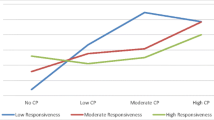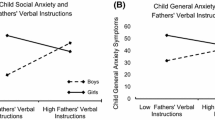Abstract
Experimental analogue methods were used to study how acute alcohol intoxication in parents influences their perceptions of and reactions to child behaviors, as well as their strategies for management of those behaviors. All participating parents had a grade school-aged son, but in half the cases this target child had a diagnosed externalizing disorder, whereas for the remaining half neither the target son nor any other offspring of the parents evidenced any psychopathology. Equal numbers of married fathers, married mothers, and single mothers from each of these groups received either alcoholic or nonalcoholic beverages prior to videotaped interactions with male child confederates who, depending on condition, enacted behaviors characteristic of either normal boys or boys with attention deficit hyperactivity/conduct/oppositional defiant disorders (ADHD/CD/ODD). Results indicated that intoxicated parents rated their ADHD/CD/ODD child partners as less deviant than did sober parents. Alcohol intoxication caused all participant groups to exhibit less attention and productive work and more commands, indulgences, and off-task talk in the interactions. Implications for better understanding of the role of psychosocial factors in the correlation between adult drinking problems and childhood behavior disorders are discussed.
Similar content being viewed by others
REFERENCES
Achenbach, T. (1978). The Child Behavior Profile: I. Boys aged 6–11. Journal of Consulting and Clinical Psychology, 46, 478–488.
Anderson, K., Lytton, H., & Romney, D. (1986). Mothers' interactions with normal and conduct-disordered boys: Who affects whom? Developmental Psychology, 22, 604–609.
Atkins, M., Pelham, W., & Licht, M. (1985). A comparison of objective classroom measures and teacher ratings of attention deficit disorders. Journal of Abnormal Child Psychology, 13, 155–167.
Barkley, R., Karlsson, J., Strzelecki, E., & Murphy, J. (1984). Effects of age and Ritalin dosage on the mother-child interactions of hyperactive children. Journal of Consulting and Clinical Psychology, 52, 739–749.
Beck, A. (1972). Depression: Causes and treatment. Philadelphia: University of Pennsylvania Press.
Bell, R., & Harper, R. (Eds.). (1977). Child effects on adults. Hillsdale, NJ: Erlbaum.
Bennett, L., Wolin, S., & Reiss, D. (1988). Cognitive, behavioral, and emotional problems among school-age children of alcoholic parents. The American Journal of Psychiatry, 145, 188–190.
Black, C., Bucky, S., & Wilder-Padilla, S. (1986). The interpersonal and emotional consequences of being an adult child of an alcoholic. International Journal of the Addictions, 21, 213–231.
Borenstein, M., & Cohen, J. (1988). Statistical power analysis: A computer program. Hillsdale, NJ: Erlbaum.
Burk, J., & Sher, K. (1988). The –forgotten children— revisited: Neglected areas of COA research. Clinical Psychology Review, 8, 285–302.
Chamberlain, P., & Patterson, G. (1995). Discipline and child compliance in parenting. In M. Bornstein (Ed.), Handbook of parenting (Vol. 4, pp. 205–225). Mahwah, NJ: Erlbaum.
Cork, R. (1969). The forgotten children. Toronto, Ontario, Canada: Addiction Research Foundation.
Crnic, K., & Acevedo, M. (1995). Everyday stress and parenting. In M. Bornstein (Ed.), Handbook of parenting (Vol. 4, pp. 277–297). Mahwah, NJ: Erlbaum.
Goldman, D. (1993). Genetic transmission. In M. Galanter (Ed.), Recent developments in alcoholism: Volume 11. Ten years of progress (pp. 231–248), New York: Plenum Press.
Gough, H. (1960). Manual for the California Psychological Inventory. (Rev. ed.). Palo Alto, CA: Consulting Psychologists Press.
Goyette, C., Conners, C., & Ulrich, R. (1978). Normative data on revised Conners parent and teacher rating scales. Journal of Abnormal Child Psychology, 6, 221–236.
Hollingshead, A. (1975). Four factor index of social status. Unpublished manuscript, Yale University, New Haven, CT.
Jacob, T., Krahn, G., & Leonard, K. (1991). Parent-child interactions in families with alcoholic fathers. Journal of Consulting and Clinical Psychology, 59, 176–181.
Jacob, T., & Leonard, R. (1986). Psychosocial functioning in children of alcoholic fathers, depressed fathers, and control fathers. Journal of Studies on Alcohol, 47, 373–380.
Jacob, T., Ritchey, D., Critkovic, J., & Blane, H. (1981). Communication styles of alcoholic and nonalcoholic families when drinking and not drinking. Journal of Studies on Alcohol, 42, 466–482.
Johnston, C., & Pelham, W. (1990). Maternal characteristics, ratings of child behavior, and mother-child interactions in families with externalizing disorders. Journal of Abnormal Child Psychology, 18, 407–417.
Keller, B. (1981). The study of reciprocal influences through experimental modification of social interaction between functional adult-child pairs. Journal of Abnormal Child Psychology, 9, 311–319.
Knowles, E., & Schroeder, D. (1990). Personality characteristics of sons of alcohol abusers. Journal of Studies on Alcohol, 51, 142–147.
Lang, A., Pelham, W., Johnston, C., & Gelernter, S. (1989). Levels of adult alcohol consumption induced by interactions with child confederates exhibiting normal versus externalizing behaviors. Journal of Abnormal Psychology, 98, 294–299.
Lazarus, R., & Folkman, S. (1984). Stress, appraisal, and coping. New York: Springer.
Locke, H., & Wallace, K. (1959). Short-term marital adjustment and prediction tests: Their reliability and validity. Journal of Marriage and Family Living, 21, 251–255.
Loney, J., & Milich, R. (1982). Hyperactivity, inattention, and aggression in clinical practice. In M. Wolraich & D. Routh (Eds.), Advances in behavioral pediatrics (Vol. 2, pp. 113–147). Greenwich, CT: JAI Press.
Lytton, H. (1990). Child and parent effects in boys' conduct disorder: A reinterpretation. Developmental Psychology, 26, 683–697.
MacAndrew, C. (1965). The differentiation of male alcoholic outpatients from nonalcoholic psychiatric outpatients by means of the MMPI. Quarterly Journal of Studies on Alcohol, 26, 238–246.
Maccoby, E., & Martin, J. (1983). Socialization in the context of the family: Parent-child interaction. In M. Hetherington (Ed.), Handbook of child psychology: Vol. 4. Socialization, personality, and social development (pp. 236–271). New York: Wiley.
Mash, E., & Johnston, C. (1990). Determinants of parenting stress: Illustrations from families of hyperactive children and families of physically abused children. Journal of Clinical Child Psychology, 19, 313–328.
Mayes, L. C. (1995). Substance abuse and parenting. In M. Bornstein (Ed.), Handbook of parenting (Vol. 4, pp. 101–125). Mahwah, NJ: Erlbaum.
Moos, R. (1974). Family Environment Scale: Form R. Palo Alto: CA: Consulting Psychologists Press.
Patterson, G. (1982). Coercive family process. Eugene, OR: Castalia Publishing.
Patterson, G. (1986). Performance models for antisocial boys. American Psychologist, 41, 432–444.
Pelham, W., & Lang, A. (1993). Parental alcohol consumption and deviant child behaviors: Laboratory studies of reciprocal effects. Clinical psychology Review, 13, 763–784.
Pelham, W., Lang, A., Atkeson, B., Murphy, D., Gnagy, E., Greiner, A., Vodde-Hamilton, M., & Greenslade, K. (1997). Effects of deviant child behavior on parental distress and alcohol consumption in laboratory interactions. Journal of Abnormal Child Psychology, 25, 413–424.
Pihl, R., Peterson, J., & Finn, P. (1990). Inherited predisposition to alcoholism: Characteristics of sons of male alcoholics. Journal of Abnormal Psychology, 99, 291–301.
Quay, H., & Peterson, D. (1983). Interim manual for the Revised Behavior Problems Checklist. Unpublished manuscript, University of Miami, Coral Gables, FL.
Reich, W., Earls, F., & Powell, J. (1988). A “comparison” of the home and social environments of children of alcoholic and non-alcoholic parents. British Journal of Addiction, 83, 831–840.
Sarason, I., Johnson, J., & Siegel, J. (1978). Assessing the impact of life changes: Development of the Life Experiences Survey. Journal of Consulting and Clinical Psychology, 46, 932–946.
Selzer, M. (1971). The Michigan Alcoholism Screening Test: The quest for a new diagnostic instrument. American Journal of Psychiatry, 127, 1653–1658.
Sher, K. (1991). Children of alcoholics: A critical appraisal of theory and research. Chicago, IL: University of Chicago Press.
Steele, C., & Josephs, R. (1990). Alcohol myopia: Its prized and dangerous effects. American Psychologist, 45, 921–933.
Steinglass, P., Bennett, L., Wolin, S., & Reiss, D. (1987). The alcoholic family. New York: Basic Books.
Wahler, R., & Dumas, J. (1989). Attentional problems in dysfunctional mother-child interactions: An interbehavioral model. Psychological Bulletin, 105, 116–130.
Webster-Stratton, C. (1990). Stress: A potential disrupter of parent perceptions and family interactions. Journal of Clinical Child Psychology, 19, 302–312.
West, M., & Prinz, R. (1987). Parental alcoholism and childhood psychopathology. Psychological Bulletin, 102, 204–218.
Woititz, J. (1983). Adult children of alcoholics. Pompano Beach, FL: Health Communications, Inc.
Woodside, M. (1988). Research on children of alcoholics—Past and future. British Journal of Addiction, 83, 785–792.
Zuckerman, M., & Lubin, B. (1965). Manual for the Multiple Affect Adjective Checklist. San Diego, CA: Educational and Industrial Testing Service.
Author information
Authors and Affiliations
Corresponding author
Rights and permissions
About this article
Cite this article
Lang, A.R., Pelham, W.E., Atkeson, B.M. et al. Effects of Alcohol Intoxication on Parenting Behavior in Interactions With Child Confederates Exhibiting Normal or Deviant Behaviors. J Abnorm Child Psychol 27, 177–189 (1999). https://doi.org/10.1023/A:1021996122095
Issue Date:
DOI: https://doi.org/10.1023/A:1021996122095




